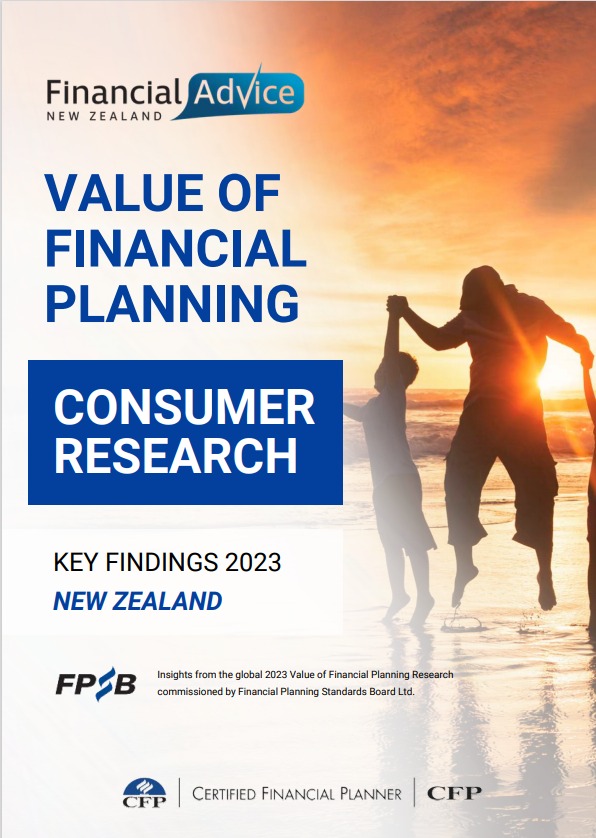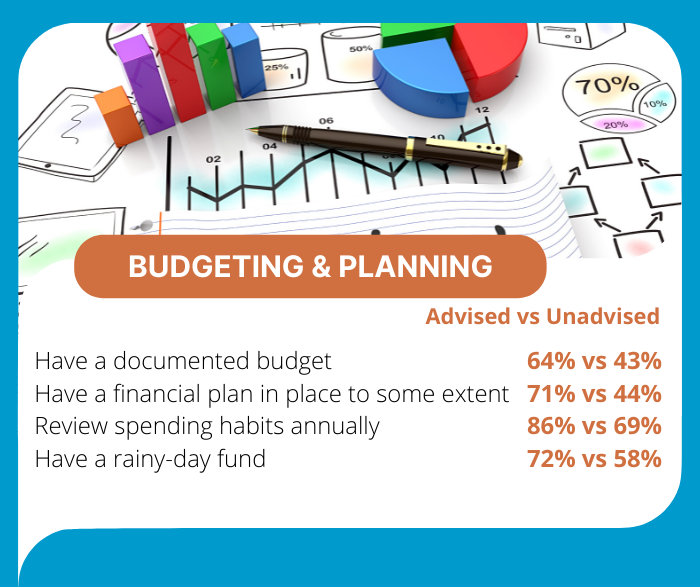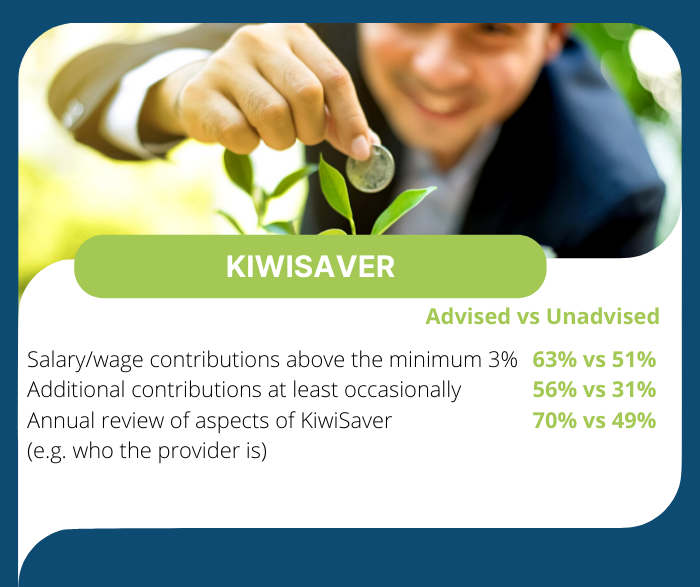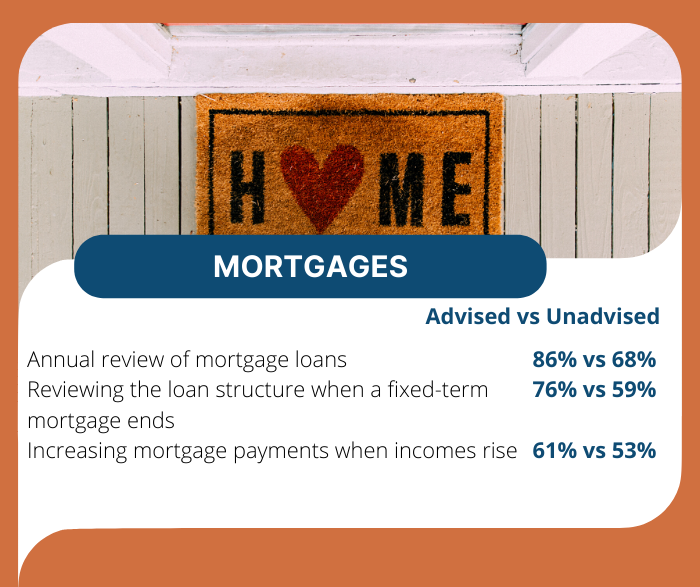Consumer Research 2023 – Key Findings
A study launched on 4th October 2023 has found New Zealanders who work with a financial planning professional are better off. It was undertaken for the Financial Planning Standards Board (FPSB) by independent research firm MYMAVINS and surveyed 1,001 advised and unadvised New Zealanders aged 25 and over and earning over $90,000 a year or holding over $50,000 in investable assets.
The Financial Planning Standards Board Value of Financial Planning Research 2023, examines the value of financial planning, measuring the financial and non-financial impact of financial planning across quality of life, financial confidence, financial satisfaction and experienced value, while debunking the myths surrounding financial planning.
While close to 3 in 5 (60%) clients of financial planners are highly satisfied with their wealth, just 1 I 3 (33%) unadvised clients feel the same way, the study found. It also found that around 9 in 10 (90%) clients of Certified Financial Planners (CFP) professionals feel financially secure and a similar proportion (80%) feeling tangibly better off. In addition, 99% of New Zealand clients trust their financial planner to act in their best interests, every one of those surveyed say they are likely to continue the relationship with their planner.
It further found that close to 9 in 10 (90%) clients of New Zealand CFP professionals say the value of financial planning outweighs the cost, with 99% saying they trust their financial planner to act in their best interests, and Gen Y-ers are more hands on, having greater experience with direct investing. 1 in 5 of Gen-Y-ers have taken up direct online trading since 2010, with a further 1 in 10 already trading before the pandemic and continuing to do so.

Research on the value of financial advice
Kiwis who seek out and receive professional financial advice exhibit good financial behaviours more often than unadvised Kiwis. According to our 2021 report, Better Behaviours – research on the value of financial advice, regardless of income level, advised Kiwis are more prepared for retirement, feel better about their financial position and are more comfortable making big financial decisions.
Building on the research report from 2020, Trust in Advice, which clearly showed that financial advice and advisers are trusted and highly valued, the Better Behaviours report measures the extent of positive financial behaviours demonstrated by advised Kiwis compared to those who are unadvised.
The independent and comprehensive survey of 2,000 people repeated many questions from the 2020 survey to determine the 2021 Financial Advice NZ Wellbeing Index* and to compare it to the 2020 results. In addition to these questions, we asked Kiwis about their financial plans, what financial products they had, when they last reviewed aspects of each product, and if they made changes. It also asked if they thought those changes would make a long-term difference to their financial wellbeing.
The results are clear – advised Kiwis exhibit better financial behaviours:
– More than two thirds of advised New Zealanders say that advice has led to outcomes such as a better understanding of the risks of their financial plan (77%), a better understanding of how to achieve financial goals (74%), and they are better equipped to actually stick to these financial plans (70%).
– The vast majority of advised consumers say that their advice relationship is meeting their needs. When asked whether the service provided by their adviser met their needs, a strong majority (91%) said yes to at least some extent.
– More than two thirds of advised New Zealanders (67%) say that their financial security has improved at least slightly as a direct result of receiving financial advice. Further to this, sizeable proportions also say that advice has had a positive impact on their mental health (46%), family life (40%), and even on their physical health (25%).
The Better Behaviours results clearly illustrate that advised Kiwis are more likely to have a documented budget and financial plan, to review their financial products regularly, to understand risk vs return, and to take-up and cancel insurance products when appropriate. They are also more likely to have positive mortgage behaviours, setting themselves up to save interest and carve years off the life of their mortgages.
Across the board (mortgage advice, investment advice, insurance advice and financial planning), quality financial advice has given Kiwis the tools to think about their finances in a pro-active way, given them more financial confidence and control, and has had a significant effect on their sense of financial wellbeing.
Thank you to the PAA Legacy Trust for a generous research grant and to Financial Advice New Zealand’s Business Partners who supported this research.
*The Financial Advice NZ Wellbeing Index measures an individual’s overall financial wellness beyond just the financial aspects and focuses on what is important to New Zealanders. With the index we can quantify the unquantifiable, and see clearly the value of advice, both now and over time.
Here’s a snapshot of the results:


Advised Kiwis are on track for better future outcomes by being better budgeters. With budgets and plans in place, advised consumers are more confident in making big financial decisions with 94% saying they are very or reasonably confident compared to 83% of the unadvised.

Higher uptake of insurance across age and income levels protects the advised. Almost twice as many advised Kiwis have Life Insurance (59% compared to 32%) and Health Insurance (55% compared to 28%) than unadvised. Usage of other types of insurance such as Income Protection and Total and Permanent Disability Insurance are more than three times higher amongst advised Kiwis than the unadvised (34% and 10%, 31% and 10%).

Higher use of KiwiSaver will drive better outcomes. Across the advised and unadvised wage/salary earners, both groups had high rates of KiwiSaver contribution (82% vs 72%).

Understanding risk and reward drives diversification and ongoing investment reviews. Beyond KiwiSaver and property, advised Kiwis are more likely to have other investments (61% vs 35%), indicating they have a wider diversification of investment assets than the unadvised.

Advised Kiwis understand the value of reviewing and making changes to their mortgage. 86% of advised Kiwis with a mortgage have reviewed that mortgage in the last year, but only 68% of unadvised have done the same. 90% believe those changes will save them money in the long term.

Advised Kiwis plan for and expect a better retirement. Across every age band, advised Kiwis feel they have a better understanding of how much money they will need in retirement (62% vs 40% overall).
